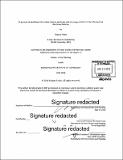In pursuit of adulthood : the urban choices and trade-offs of young mothers in the aftermath of Hurricane Katrina
Author(s)
Trebic, Tatjana
DownloadFull printable version (6.052Mb)
Alternative title
Urban choices and trade-offs of young mothers in the aftermath of Hurricane Katrina
Other Contributors
Massachusetts Institute of Technology. Department of Urban Studies and Planning.
Advisor
Mariana Arcaya.
Terms of use
Metadata
Show full item recordAbstract
Why, against the promise of greater opportunity, do some young people choose to stay in or return to high-poverty, disadvantaged neighborhoods? As they transition to adulthood, young people begin to make decisions regarding residential choice, household economics, and their interpersonal and social obligations. Understanding the complexity behind these decisions can help demystify the calculations behind their urban choices. Recognizing the valid and poorly understood reasoning of this group can help planners rethink the urban amenities and services needed to support young people as they affirm their emerging adulthood identities in the modern urban context. This study traces the trade-offs and tensions faced by a group of low-income mothers navigating the reconstruction of their emerging adulthood lives in the aftermath of Hurricane Katrina. Focusing on the life stories of 53 young women between the ages of 19 and 29, this study reveals a new framework for the way emerging adults make decisions about which neighborhoods to live, work, study, and raise children in. Based on the social and psychological milestones of adulthood which mark achievements in education, work, independent living, marriage, parenting and independence, this framework sheds light on the additional constraints and considerations low-income emerging adults must negotiate as they transition to adulthood in urban America. Their considerations move beyond factors such as neighborhood safety, dwelling size and characteristics, and affordability: parental responsibility and economic scarcity compete with the achievement of personal milestones as young mothers straddle the choice between capitalizing on the support of their social network and attaining self-sufficiency. As the young mothers debated the feasibility of pursuing greater opportunity in new places or returning to familiar contexts, the neighborhoods that surrounded them served to magnify or clarify the various tensions they faced. This suggests that city form, city amenities, and city services play an important role in facilitating or hindering transitions to adulthood. Expanding on current knowledge about neighborhood choice, these findings provide additional insight on how a vital segment of our urban population makes the decisions it does. This study bears implications and provides suggestions for how planners and policy makers can better serve this transitioning group through improved policy and more appropriate social services and institutions. Additionally, this work raises a number of key questions cities must consider as they welcome displaced populations or build resiliency among their young adults against large-scale disruptions to their neighborhoods and urban lives.
Description
Thesis: M.C.P., Massachusetts Institute of Technology, Department of Urban Studies and Planning, 2016. Cataloged from PDF version of thesis. Includes bibliographical references (pages 49-55).
Date issued
2016Department
Massachusetts Institute of Technology. Department of Urban Studies and PlanningPublisher
Massachusetts Institute of Technology
Keywords
Urban Studies and Planning.